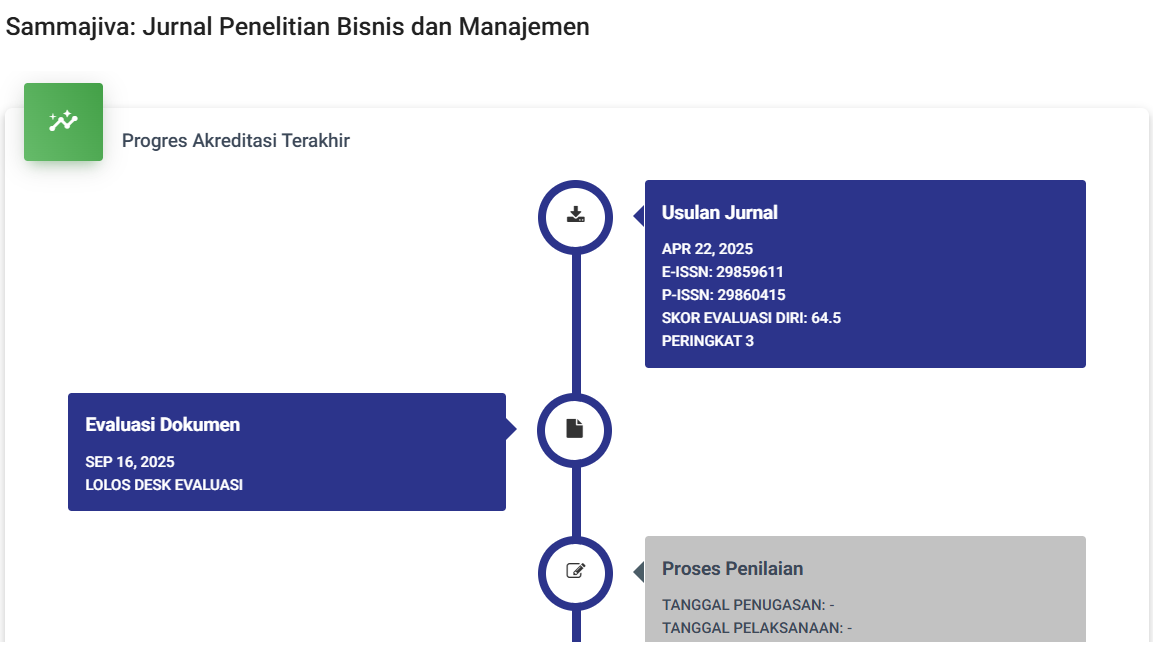Pengaruh Motivasi Terhadap Kinerja Pegawai Negeri Sipil (PNS) pada Badan Pendapatan Daerah (Bapenda) Kabupaten Paser
DOI:
https://doi.org/10.47861/sammajiva.v2i4.1604Keywords:
Motivation, Performance, EmployeesAbstract
The aim of this research is to determine the influence of motivation on the performance of civil servants (PNS) at the Paser Regency Regional Revenue Agency Office. The results of the validity test show that the total of 15 statements all have a value greater than 0.2973, which means that the rtable value can be interpreted as the conclusion that all statements are declared valid. From the results of the reliability test, it can be seen that the results obtained were Cronbach'alpha 0.913 > 06, which means that the questionnaire items were declared reliable (feasible). From the research results, it was found that the regression equation Y= -1,546+0,054 +1,199 +0,593 +0,065 +0,799 . The correlation coefficient (R) is 0.889. This shows that there is a strong relationship between the variables Physiological Needs (X1), Safety Needs (X2), Social Needs (X3), Esteem Needs (X4), and Self-Actualization Needs (X5) on Employee Performance (Y) at the Paser Regency Regional Revenue Agency Office. Meanwhile, the R square determination is .0790, which means that motivational variables or influences have an influence of 79.0% on the performance of Civil Servants (Y) at the Paser Regency Regional Revenue Agency Office, while the remaining 21% is influenced by other variables not included in this research. From the results obtained Fcount is 7.161 > Ftable is 2.46. This means that there is a joint influence between the variables Physiological Needs (X1), Safety Needs (X2), Social Needs (X3), Esteem Needs (X4), and Self-Actualization Needs (X5) on the Performance of Civil Servants (PNS) at the Paser Regency Regional Revenue Agency Office. Thus, the hypothesis which states that Physiological Needs (X1) has a dominant influence on the Performance of Civil Servants (Y) at the Paser Regency Regional Revenue Agency Office is not accepted because according to the research results, the dominant variable is the Security Needs variable (X2) with a value of tcount > ttable (2.431 > 2.02439).
References
Andi Wrahadi, M. (2019). Pengaruh motivasi terhadap kinerja pegawai Dinas Pertanian dan Perkebunan Kabupaten Paser [Skripsi]. Sekolah Tinggi Ilmu Ekonomi (STIE) Widya Praja.
Busro, M. (2018). Teori-teori manajemen sumber daya manusia (Edisi pertama, Cetakan pertama). Prenamedia Group.
Cen, C. C. (2022). Manajemen sumber daya manusia (Cetakan pertama). PT Inovasi Pratama Internasional.
Darmawan, S. (2023). Statistik deskriptif (Edisi pertama, Cetakan pertama). Gava Media.
Fahmi, I. (2019). Manajemen sumber daya manusia: Teori dan aplikasi (Edisi pertama, Cetakan pertama). CV Alfabeta.
Gufron, A. (2020). Pengaruh motivasi terhadap kinerja pegawai pada Kantor Kelurahan Tanah Grogot di Kecamatan Tanah Grogot [Skripsi]. Sekolah Tinggi Ilmu Ekonomi (STIE) Widya Praja.
Hasibuan, M. (2019). Manajemen dasar, pengertian, dan masalah (Edisi revisi). PT Bumi Aksara.
Irmayani, D., & Wayan, N. (2022). Manajemen sumber daya manusia (Cetakan pertama). Deepublish.
Kesumawati, R. S. (2021). Pengantar statistika penelitian (Cetakan pertama). PT Rajagrafindo Persada.
Silaen, et al. (2021). Kinerja karyawan (Cetakan pertama). Widina Bhakti Persada Bandung.
Sugiyono. (2022). Metode penelitian kuantitatif dan kualitatif (Cetakan kedua puluh sembilan). Alfabeta.
Sujarweni, V. W. (2023). Metodologi penelitian lengkap, praktis, dan mudah dipahami (Cetakan pertama). Pustaka Baru Pers.








